Schrödinger’s Kittens, Fatalism and Faith
Nihilism Remains Irrational Despite Relentless Progress in Science and Technology
I think, therefore I am
Rene Descartes
Beck is humbled by Zeus when he Saw Lightning
Mindblowingly, in 2023, Humankind smashes ever-tinier atomic particles in gigantic super-colliders while also exploring ever-further expanses of our Cosmos with bigger and badder telescopes. As Humankind always has, we continue desperately seeking answers to our most fundamental questions about the nature of our Universe. Most central is the horrifying question of what happens to our soul or consciousness upon our death. Do we just get blinked out of existence? Or is there some continuation, some afterlife or reincarnation?
More pleasant to contemplate, the latest results from NASA’s James Webb telescope and CERN’s Large Hadron Collider are spectacular and awe-inspiring:
After a 40 year search, the Higgs Boson was discovered a decade ago. Sometimes referred to as the God Particle, its discovery confirms the presence of theorized Higgs fields, essential in the creation of the mass of particles, matter itself. It had been a ‘missing link’ — its existence was predicted by the Standard Model of particle physics and essential to the mechanics of the Big Bang Theory. So this observation finally being made after decades of searching majorly bolsters both theories and our understanding of our Universe.
Meanwhile, some of the most exciting early discoveries from the James Webb telescope stem from its ability to show us glimpses of the Universe much farther away than ever before, now over 13 billion light years. This also corresponds with 13 billion years ago as well, as the light took that long to reach the telescope. So, this amazing achievement allows Humankind to peer 97% of the way back to the big bang, far earlier than ever before. And the new telescope is finding galaxies like our Milky Way having formed earlier than understood, now at least 11 billion years ago. Perhaps even more awesome, the new telescope brings us stunning images of more recent stars being born (see below). The Webb telescope gives us striking detail of the tips of the ‘fingers’, where the action is occurring, new stars emerging. Some compare these formations to God’s hands in Michelangelo’s ‘Creation of Adam’ scene gracing the Sistine Chapel. Similar sentiments earn these formations among the Eagle nebula the nickname “The Pillars of Creation.”
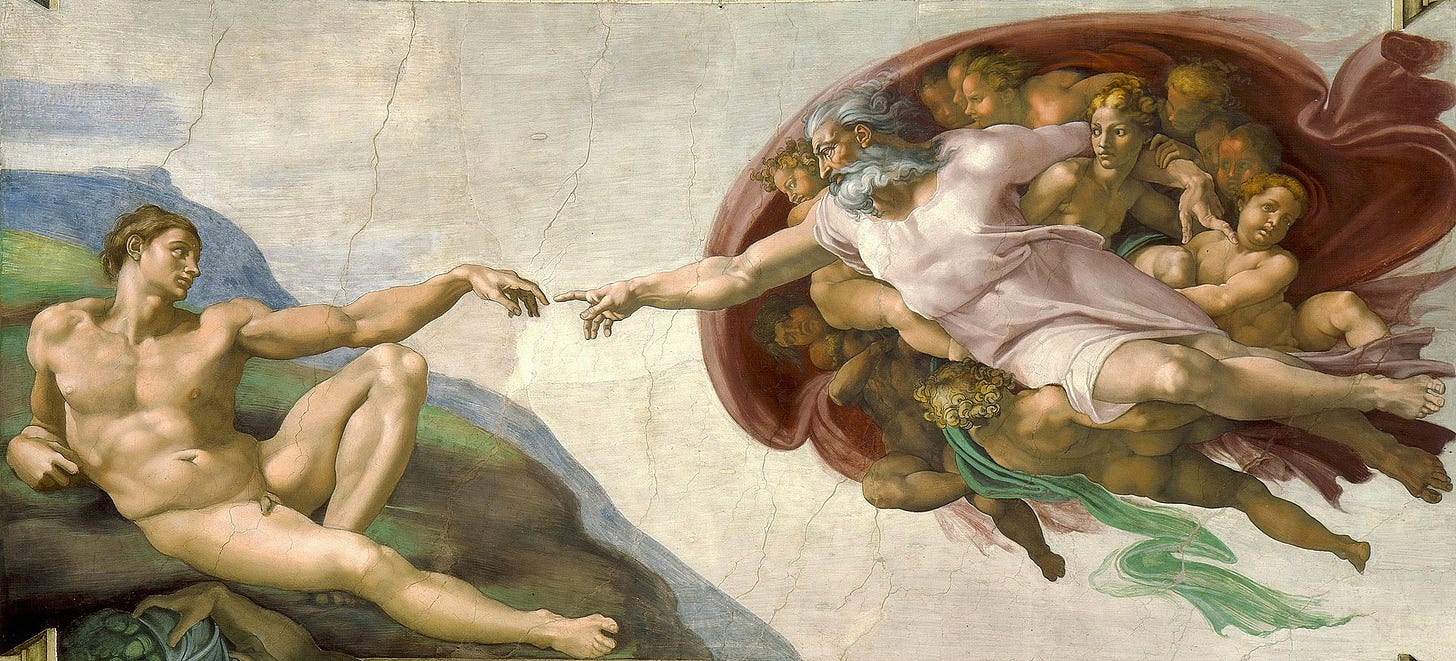
But as awesome as these discoveries are, these mystical names reveal some hubris. They suggest the observations give Humankind a Godlike understanding and further that such knowledge might replace spirituality. Discovering a few new mechanisms and cementing theories about the functioning of our Universe is critically important of course. But these observations do not get us any closer to answering our most fundamental spiritual questions: what happened before the big bang and how did it all get there? What is the nature of our consciousness? What is the a meaning of life if anything? Do we have free will or is our destiny predetermined? What happens to our souls/consciousness when we die?
Science simply can’t answer many of these questions due to its format and requirements. Science requires a convergence, not just one-off observations by a single actor, which scientists are often trained to reject as anecdotal.
Meanwhile, as far as Humankind is aware, death is a one way street. So observing and reporting back on it in scientific fashion is just not in play. Even if individuals hypothetically return from death, we still could not scientifically prove such experiences occurred. There would be a fundamental problem with reliability since we cannot experience another person’s consciousness or memory. Rejecting individual’s reports as anecdotal appears to create an irresolvable impasse.
Studying consciousness is similarly fraught. As Descartes famously philosophized with “I think therefore I am”, individuals can be truly sure of their own consciousness, as perhaps the one and only thing that can ever be proven from a certain denialist perspective. It is perhaps impossible to validate whether others experience the world in the same way, or really at all.
Simulation Dehumanization
As Musk suggests in the tweet above (and is uber popular philosophically in our digital age) it is possible we inhabit an artificial, simulated Universe controlled by come sort of near-future computer technology, like in the movie, The Matrix, or the fictional arcade game Roy, a Life Well Lived from Comedy Central’s Rick and Morty:
However, Musk gets it exactly backwards with his statement on NPC aka ‘non player characters.’ NPCs are a meme, popularized on 4chan and ubiquitous among the alt-right. It communicates the notion that many humans in the real world are uninhabited by real consciousness, like the lifeless, drone characters in a video game. Musk mentions this NPC meme regularly, even suggesting many corporate CEOs and “most people in the corporate world” seem like they might be shells to him, just NPCs in a simulated world. With his “If you don’t think there’s at least a tiny chance you’re an NPC … you’re an NPC,” Musk suggests if you haven’t considered that you are not truly conscious and alive then this means you are not. This however is philosophical fallacy, the opposite of Descartes famous rationalization.
With what consciousness could you consider that you didn’t exist if you didn’t actually exist? It is utter garbage.
Rather, Musk’s nonsensical suggestion seems designed to impart the idea among impressionable followers, that many around them are indeed NPCs, just vacant shells, not real humans capable of love and hate, despair and hope, dreams and nightmares. Musk’s statement has no qualifications.
Consciously or not, Musk has issued severely dehumanizing language and philosophy to his adoring fans. Many of Musk’s followers (though not nearly all of course) are alt-right, game-addicted young men brought up playing first-person-shooter video games. This same, alt-right crowd has carried out many terror attacks in the US and throughout the free world, including the mass shooting massacres in Buffalo, NY, Pittsburgh, PA, El Paso, TX, Christchurch, NZ, Highland Park, IL and others. These terrorists sometimes even compete for the ‘high score,’ the most kills, as the online chan-board peanut gallery cheers them on, sometimes over live stream like a grotesque, real-life game of Call of Duty.
It could not be more irresponsible for Musk to suggest that just like in video games, real life humans might be similarly expendable, as one of the most powerful and influential men in the world. It is difficult to imagine Musk doesn’t know better. He controls some of the most sophisticated engineering firms in the world so he surely must have a sophisticated understanding of how tech and influence play off one another.
But Musk is pushing nihilistic notions whether he subscribes to them or not. He is a leader and his words have real consequences influencing countless others. Obviously, many look up to Musk like a hero for all his accomplishments, which are, of course, incredibly impressive. He says he’s motivated fundamentally to accelerate Humankind’s reaching Mars, largely as an escape hatch should we destroy our Earth. This seems like a noble, rational goal. But this nihilistic BS doesn’t advance that in the slightest. Perhaps fine in a one-off conversation or mention, but definitely immoral to repeatedly make this point publicly to your adoring fan-base, without reservation or correction.
C’mon Elon. Get it together. We need your talents on batteries, cars and rockets, not promoting this nihilistic, dehumanizing bullshit. In fairness, it must be quite the mindfuck to be the most financially successful man on the planet. But it would be super if Musk were to be more humble and grateful for that, rather than a douche.
Unoberservable Quantum Weirdness
In one of the great thought experiments of the 20th century, Carl Schrödinger created his famous device in dialog with Alfred Einstein regarding Neil Bohr and Werner Heisenberg’s interpretations of quantum mechanics. Schrödinger and Einstein had serious beef with Bohr and Heisenberg’s interpretations, now known as the Copenhagen Interpretation.
To demonstrate why he believed their theory absurd, Schrödinger expanded its ramifications from the subatomic scale to one more familiar. According to Bohr, subatomic particles exist as a wave function, a series of probabilities, not anything concrete. Practically speaking, this predicted that multiple quantum states occur simultaneously and exist superimposed, behaving with wave-particle duality, each a possibility, up until the moment a measurement is taken, the moment of observation, when they would then collapse into one of the states, as is familiar in the world we observe.
To demonstrate the supposed absurdity, Schrödinger devised a hypothetical scenario. Inside a box, a quantum event, a radioactive source, might (or might not) trigger a hammer to drop on a vial of poison gas, releasing it, killing the cat (or not.)
According to Bohr’s theory, given a range of time, the radioactive source would exist in both degraded and not-degraded states simultaneously, in quantum superposition, having both triggered the death trap and not triggering the death trap also simultaneously. Strangely, Schrödinger’s cat is both dead and alive until the box is opened, triggering collapse of the states with observation. (side note: the scenario seems to assume cats have no consciousness to make an observation, which seems unlikely to me.)
Einstein noted: “Nobody really doubts that the presence or absence of the cat is something independent of the act of observation.” But is this really our reality or an unfounded assumption? Just because are not wired to conceptualize the world that way does not mean we should discard the possibility.
By 2018, multiple studies created these weird quantum superpositions in scales far larger than subatomic, observed in “mesoscopic” scales perhaps as large as viruses and bacteria, and some dubbed these ‘Schrödinger’s kittens.’ Relatively larger objects may indeed exhibit quantum superposition until observed, and now experimentally documented several times over. Though not proof of their interpretation, the data do seem to bolster Bohr’s and Heisenberg’s conceptions.
And could this weirdness apply to even larger scales more familiar? Just because we’re not designed to process the Universe in this fashion doesn’t mean we should discount the possibility. This leads to the philosophical question:
Does the moon exist only when I look at it?
Albert Einstein (pissed off at quantum physics)
Also more recently experimentally validated, though perhaps not thoroughly proven is the phenomenon of quantum decoherence. This compelling theory links the weirdness of quantum physics on a tiny scale to our familiar classical mechanics on scales we can sense. It holds essentially that these strange effects get ‘diluted’ as quantum superimposed particles interact and entangle with their environment. As they do so, they essentially tie their quantum fates together. As particles become more and more entangled, it becomes more and more difficult for the combined system to maintain coherence. That is, the superimposed states might all collapse at once in the process of decoherence, into classical physics dynamics, like the world we know and observe. Some interpretations of this theory hold that classical physics emerges from the quantum world only when observed, necessarily relative and local.
Weird shit.
If that doesn’t hurt your brain enough, consider that like Einstein’s theory of relativity, where gravity is a function of mass warping the fabric of space-time (rather than a wave or particle based force - see figure below), perhaps our collective consciousness bends the universe of particle physics into the classical world we observe.
Maybe then the Universe untouched by any consciousness exists entirely in coherent quantum superimposed states. (Could first consciousness have triggered the Big Bang? 🤔) Analogous to physical gravity, the triggering of classical physics might similarly be caused by the ‘weight’ of our collective consciousness, our sensory sphere warping a sort of perceptual-time matrix. Perhaps we might consider a theory whereby consciousness emanates an analogous sort of relativistic, spiritual gravity.
Humans have no means to sense the difference in potential, as our bodies do with gravity induced by physical mass. Similarly to the futility of reporting back on death, observing quantum superimposed states appears an impossibility. We simply don’t have machinery to sense the world as it exists in quantum superposition. The measurement paradox makes things awfully tricky. So conceptualizing this concept as spiritual seems appealing. It is related to a necessarily weird aspect of the universe we can never observe and are not programmed to understand (and makes my brain hurt a lil bit.)
Respecting Certain Uncertainty
Call me paranoid, but it seems to me there is a lot of room for shenanigans in a quantum world that only exists when we’re not looking (or maybe in other dimensions according to other interpretations.) What could beings with higher (or different) consciousness be doing behind those curtains? And that’s without separately considering Einstein’s other big complaint: quantum physics’s “spooky action at a distance.” And yet another unnerving fact: a huge majority of matter seems to exist in a form we can’t yet detect — dark matter.
If one was to program an artificial meta-verse, might one only want to use resources calculating only what is necessary to deliver the content to conscious observers and no more? Seems rather convenient from a programmers perspective for this dynamic to exist, if only observation coaxes classical mechanics into existence. But convenience of course cannot prove anything.
Elsewhere, some of the quirks in quantum physics seem so counterintuitive. Could those also just be simplifications, approximations of physics too small to really matter in a virtual world? Might Humankind be rubbing up against design constraints of an artificial meta-verse?
But again, even if we were sure that were the case, we still don’t know what happens when we die in this Universe (or whatever one from which we originally stem.)
Do we just take the helmet off like Rick from Rick and Morty and play another game? Seems a bad assumption.
The notion that it doesn’t matter, that ours or others souls are expendable, that we’re not being watched or judged by a higher power — none of this is precluded by us ‘living in a simulation.’ Many possibilities of an immersive simulated world lend themselves perfectly for judgement of character, and whoever controls an artificial Universe is perhaps its God (or at least its Emperor).
Tarot’s Emperor in Current Global Conflicts
We have not even to risk the adventure alone for the heroes of all time have gone before us. The labyrinth is thoroughly known. We have only to follow the thread of the hero-path… -Joseph Campbell
There is so much now that we know that we do not know about our Universe. It remains quite irrational to be nihilistic, thinking Humankind now has all the answers, that we no longer have any need for the spiritual. God may mean many things to many people, but current understanding of our Universe leaves room for a non-supernatural higher power in any case.
The ‘living in a stimulation’ theory demonstrates one such possibility of a sort of God, the master of that multiverse, be it human or something else.
Also leaving room for another sort of God are untested theories regarding super-organism consciousness. Such theories suggest human societies, humanity as a whole and/or all life on Earth create a super-organism consciousness that could somehow link (and perhaps even direct) us all, a sort of God.
Perhaps more centrally, conceptions that may seem based in the supernatural today may be the only means possible to conceptualize far-future technology with current understanding. Demonstrating this from the reverse angle — how could one explain the ‘living in a simulation’ theory to Descartes or his contemporaries? The computer technology part of the modern theory would appear as if supernatural, as magic. And Descartes did indeed fathom a supernatural simulation theory, his Deus deceptor, or Evil Demon.
So, callously discarding the possibility we might be judged or punished (or that we should act with decency fundamentally for other reasons) is irrational, even if one calculates the chances to be quite small we will face punishment in the afterlife or karmic retribution of some sort. The stakes may be enormous given the oceans of time that exist outside our lifetimes and all that we don’t understand.
Faith also refers to more than just belief in a God or similar concept. Free will is also a matter of faith. The existence of free will and some God are both question marks unanswerable by science, and the two are more fundamentally related than appears at first glance. If there is no God and everything is so mechanical and explainable by formulae and number crunching, then how could we possibly have free will either? Aren’t we just then watching a movie with some extra sensations and an internal monologue?
Whether or not we are compelled to have faith in free will or a God viscerally, it is rational and logical to choose to have such faith, at least after one accepts that one cannot know the mysteries of our mortality. Or at least to try conjure faith. Our choices are pretty binary in these matters.
For matters of free will, choosing to believe fatalistic or deterministic notions seems to me like half-assing it. Resigning. Believing one’s decisions are not truly meaningful. Eventually such attitudes will lead to worse outcomes for oneself and those around oneself. Why hustle for anything or anyone if everything is predetermined anyway? Why care?
Regarding faith in a higher power, or perhaps fear of a higher power, Pascal’s wager seems to me logical and compelling reason to at least try to conjure faith or at least fundamental respect for the human decency that might save you from eternal damnation (or massive karmic retribution.) Blaise Pascal reasoned in Pensèe, published 1670:
If there is a God, He is infinitely incomprehensible, since, having neither parts nor limits, He has no affinity to us. We are then incapable of knowing either what He is or if He is....
..."God is, or He is not." But to which side shall we incline? Reason can decide nothing here…
…
Let us weigh the gain and the loss in wagering that God is. Let us estimate these two chances. If you gain, you gain all; if you lose, you lose nothing. Wager, then, without hesitation that He is.
The stakes are just so grand in terms of salvation and the afterlife, reasons Pascal echoing his Christian faith, we’d better act with decency and accordance to his conception of God’s will, clearly the correct wager to make when one cannot possibly know. He’s not wrong. Pascal‘s statement, aside from his conceptions of God, seem valid even if our Universe is some artificial metaverse - our behavior might be judged by higher consciousness beings. Ed’s wager - regardless of conceptions of God, I bet on acting with fundamental decency. That is, demonstrate kindness and compassion to Humankind present and future; work to provide and care for oneself, loved ones, guests and occasionally others in need when possible; address conflicts as peacefully and cooperatively as possible. Approach this enthusiastically and passionately even, if you can conjure it. Why not?
If we are to be judged or face karmic retribution, this is clearly the most wise course. If we are not and our deaths represent the end of our existence, then the time we have here is unspeakably short and precious - while we might act selfishly and indecently for comfort, pleasure and power, it is our human connections that bring us meaning and satisfaction in my experience. In the face of existential dread, love and connection becomes the antidote, or at least the consolation prize, in my experience. Acting with basic decency is also endlessly defensible and practical.
Beyond spiritual game theory, finding faith or meaning is fundamentally important. Faith and/or meaning are what keeps us sane. These motivate us. These inspire us. These justify our toiling and suffering that we must necessarily endure. And lack of these can lead to dark and ugly places.
Beauty, grace, transcendence, meaning, awe - in my experience these are often fleeting and rare. So when we do find these, we must cherish them and share them and remind one another, teach our kids about them. And as Joseph Campbell taught us, the proper role of storytelling, mythology and art is to share this meaning, this spark that speaks to our souls. Not as explicit directions to follow, but as tools more like compasses and mirrors. These help us make sense of ourselves and this strange Universe, to navigate a better path for ourselves and loved ones. These provide framework over the gaping voids science can never fill. They help us build solid, moral-spiritual structure that might otherwise be filled by the wobbly, flavor-of-the-moment garbage emanating from the impulses and self-interests of nihilism.
All that being said, what appeals to some may not others, in mythology, art and everything else. Best to find room to accept this, respect this, and each other.
Defeating one’s devil of nihilism couldn’t be more important. So is leaving room for others to defeat theirs in their own ways.





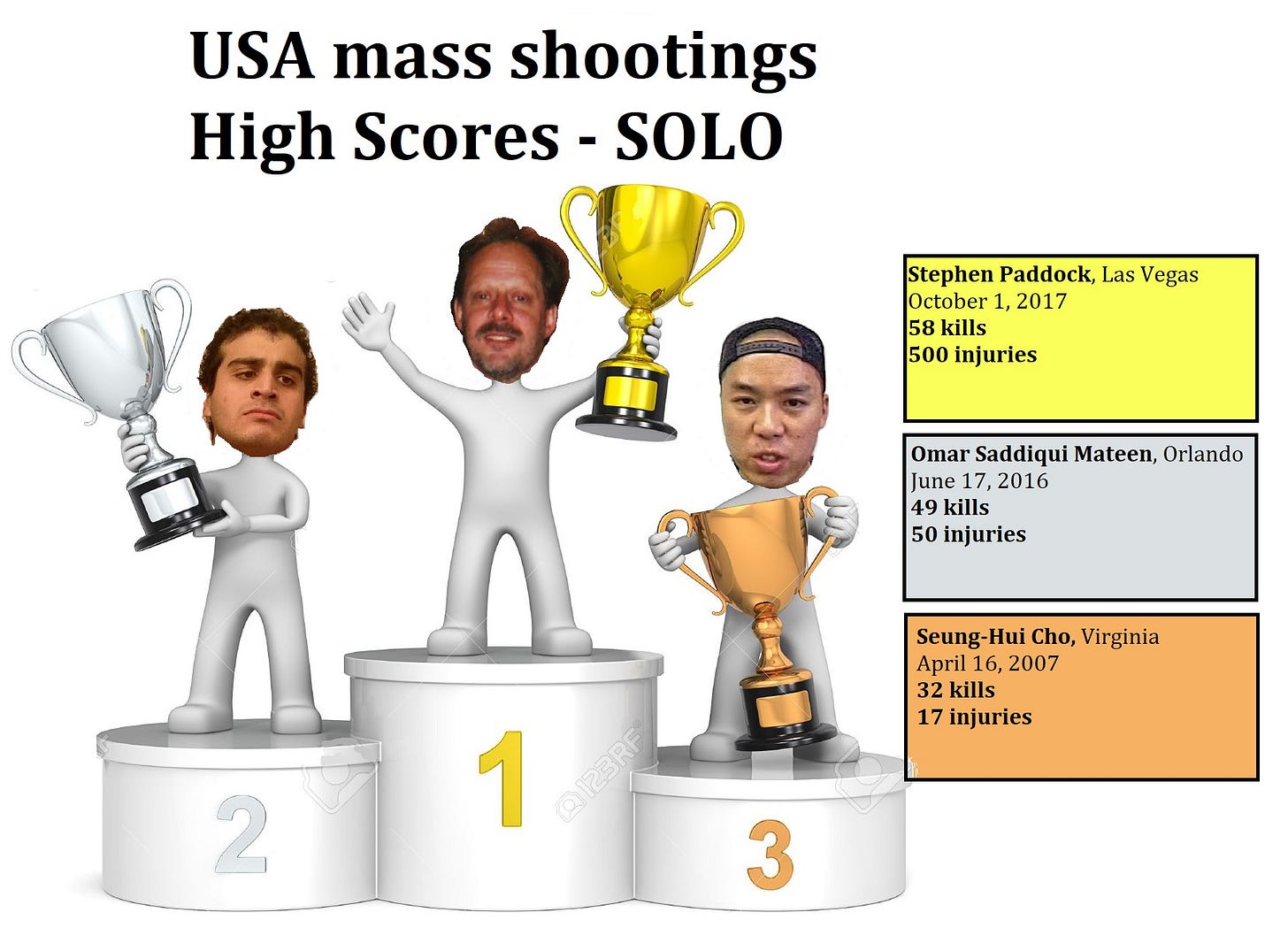
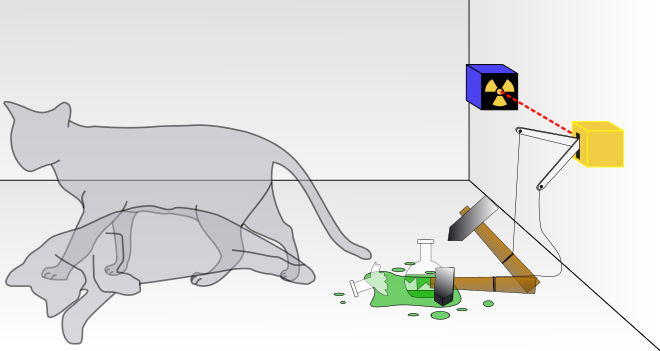
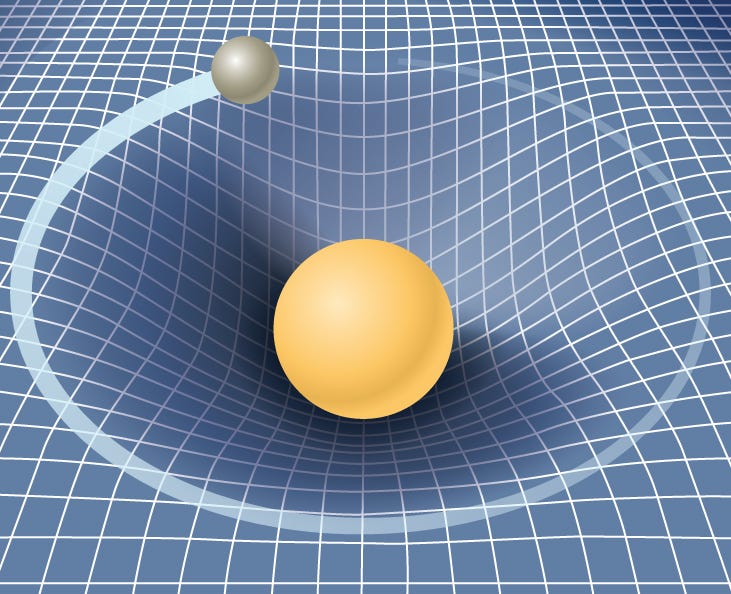
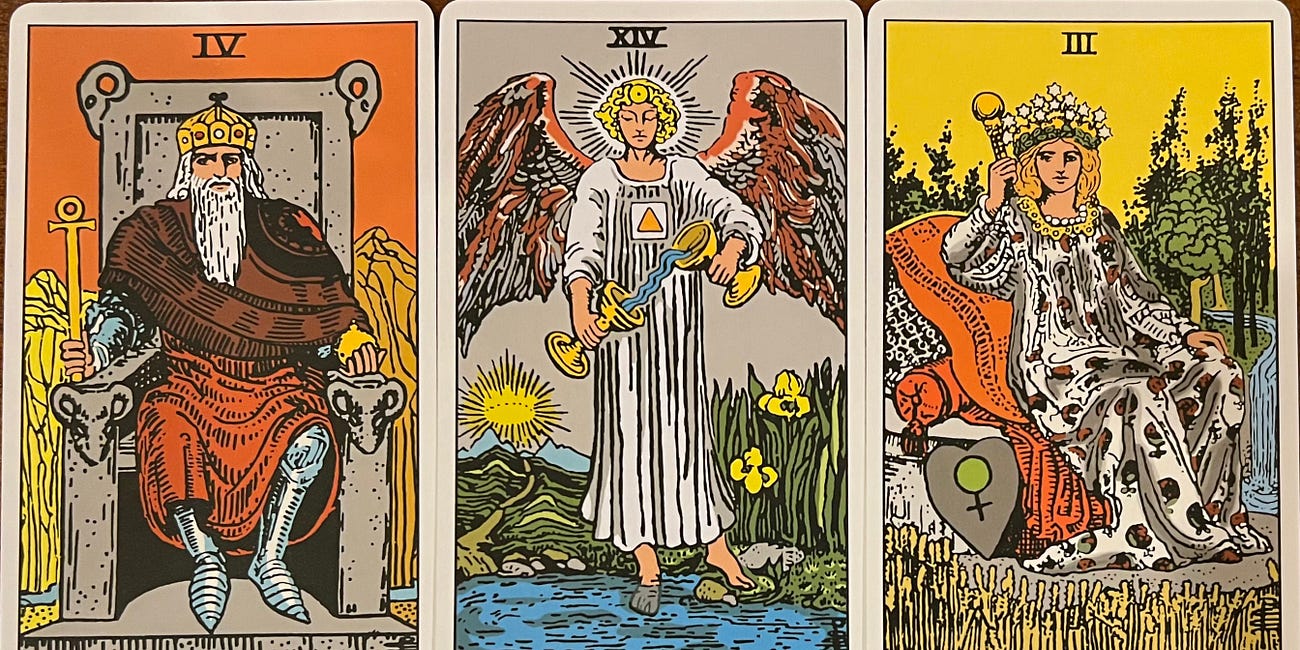
Thank you for this profound, provocative and enlightening post!! While it’s painful to accept our limitations and to face the hard stop that death may be, the tonic is the beauty and comfort of communicating and sharing perspectives, showing love and living in the moment. You achieved that and much more here - for this, you have my deepest gratitude.
This article is an elaborate god of the gaps argument. No matter how complex or floral the language it rests on two key assumptions:
1) The proponent believes they can know all possible scientific explanations and rule them out.
2) The proponent, having ruled out all scientific explanations, argues they can reach meaningful and falsifiable conclusions without using the scientific method.
For example:
""But these observations do not get us any closer to answering our most fundamental spiritual questions: what happened before the big bang and how did it all get there?"
Why is that fundamental? The assumed answer seems to be that there is a God that meaningfully interferes post the big bang. What evidence do we have of this? If this being doesn't actively interfere (i.e. a deistic God) what difference would there be between that and a non-existent God?
"Or is there some continuation, some afterlife or reincarnation?"
This a question science has answered. The answer is no. Lets do a hypothetical, you wrap your arms around my throat and squeeze hard enough that oxygen stops flowing to my brain. What happens if you do that for long enough? I lose conscious. Crucially, I would lose conscious _before_ dying. Whilst that doesn't prove the brain is entirely responsible for consciousness, it does demonstrate that the brain is essential for consciousness. Death is the brain ceasing to function, ergo death is the end of our consciousness.
This also renders Pascal's Wager meaningless but lets assume that there is someone judging us (despite, as far as I am aware, there being no evidence for this). Even then Pascal's Wager doesn't hold water. Pascal's Wager only makes sense if a) There is one knowable God or set of Gods and b) We can know what that being wants from us. There are thousands of religions with conflicting beliefs and practices. Adhering to any specific religion could anger this God by committing Blasphemy (Oops, you lost the wager because you picked the wrong religion). Maybe this God values rationality and anyone who believed in a God, without reason, would be viewed by this God as irrational and unworthy (Oops, you lost the wager because God was testing you by creating a universe that should have lead you to the opposite conclusion).
You make this point: "That is, demonstrate kindness and compassion to Humankind present and future; work to provide and care for oneself, loved ones, guests and occasionally others in need when possible; address conflicts as peacefully and cooperatively as possible. Approach this enthusiastically and passionately even, if you can conjure it. Why not?"
Why do you seem to assume that your God has values that match your own? The Ancient Greeks often portrayed Gods behaving like Humans (having sex, fighting, getting jealous etc.) Why? Probably because as human beings, they had difficulty envisioning beings who were extremely powerful, extremely long living and would have had massively different experiences and outlooks to human beings. If this God had your values and is powerful enough to create the universe, why do genocides, diseases and natural disasters occur? (Free will does not explain diseases, particularly genetic ones) If you had the ability to stop those things, wouldn't you?
"Whether or not we are compelled to have faith in free will or God viscerally, it is rational and logical to choose to have such faith. Or at least to try. Our choices are pretty binary in these matters." You seem to do this often in the article. That is one of many subtle but noticeable false dichotomies. How about using Skepticism as the founding of a complex and empathetic morality? By understanding that there is no moral law giver, no objective morality, one almost necessarily needs to question how to make moral decisions.
This can (though obviously not always) lead to Humanism or Utilitarianism. By predicating morality on a principle of do the least harm and the most good, one can continue to try and improve, rather than settling for dogma or just interpreting scripture to reinforce your existing beliefs.
I found this section particularly damning of your logical process:
"If there is no God and everything is so mechanical and explainable by formulae and number crunching, then how could we possibly have free will either? Aren’t we just then watching a movie with some extra sensations and an internal monologue? Sorry - that seems so _unappealing_ and not particularly rational either."
Something being unappealing has no influence on its rationality or truth. It is also another example of those subtle false dichotomies. Why would having an all powerful creator being be more conducive to free will? Would there be any real way to do something this creator being didn't want us to do? Just because there wouldn't be specific programming in the back ground of such a universe, doesn't mean it would be any different in practice.
Lets assume the universe doesn't have a God. Why would that prevent us having goodwill? Do you have any reason to gain say this hypothetical, other than the fact you don't like it? If you don't, that is just an appeal to consequences fallacy something that would be "...irrational...".
"These provide framework over the gaping voids science can never fill. They help us build solid, moral-spiritual structure that might otherwise be filled by the wobbly, flavor-of-the-moment garbage emanating from the impulses and self-interests of nihilism." This is another false dichotomy. Your assumption appears to a moron and racist's (Elon Musk) view of nihilism versus spirituality. You also seem to assume science has nothing to say on these topics.
Psychology explains a lot about how and why people make decisions (including things like confirmation bias). It explains why people benefit from religion (community, routine, a purpose) but in doing so it demonstrates that religion doesn't offer anything that can't be found else where. It doesn't require a belief in God for me to find meaning from my family, DnD and sport. It also doesn't require me to be a member of a church to have empathy for racially oppressed minorities, LGBTQ+ individuals, people who are physically or mentally ill, victims of dictators and war. It just takes empathy, careful assessment of any belief, along with the willingness to accept that I will be wrong (and have been) sometimes.